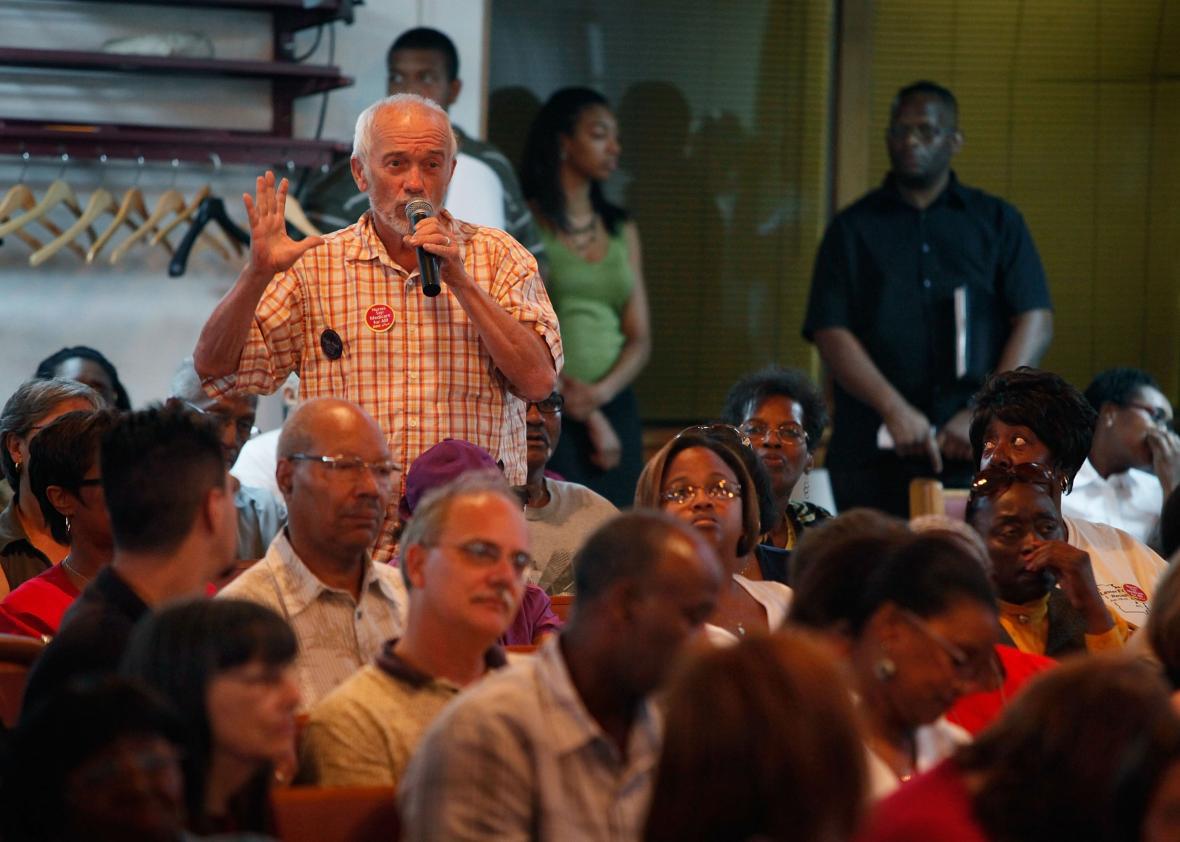On Saturday, remarks made by Republican Rep. Dave Brat of Virginia in a meeting with conservative activists were recorded and later made public. In a speech, Brat, who is best known for defeating then–Majority Leader Eric Cantor, lamented that female constituents angry about the Trump administration were beginning to wear him down. From the Richmond Times-Dispatch:
“Since Obamacare and these issues have come up, the women are in my grill no matter where I go,” Brat told an audience Saturday at a meeting of conservative groups at Hanover Tavern.
“They come up—‘When is your next town hall?’ And believe me, it’s not to give positive input.”
Brat, R-7th, asked the GOP-friendly audience to get organized.
“Help us write newspaper articles. We’re getting hammered,” he said.
Brat’s remarks were posted to a Facebook page run by one of the groups that has organized specifically to make Brat hold a town hall. ” ‘When is the next Town Hall meeting?’ is not an accusation, it’s a question,” the group wrote in its post. “Congressman Dave Brat, your constituents would like to hear from you. You ran on a platform that you would be more accessible and we could hold you accountable, right? We would love to hear more about things you talked about in this video.”
This is exactly the approach Democratic voters around the country should be taking. For more than a week now, members of Congress have been inundated with thousands of phone calls that, along with the scale of the protests that have taken place over the past two weekends, have surely made palpable the extent to which Trump and the priorities of Republicans in Congress are loathed. But while calls can work, congressional staffers rarely record more than a few words for delivery to representatives, especially if callers are using the kinds of scripts that have been circulating over the past several days. This is why activists who want to directly and forcefully address their representatives should demand town halls.
Witness what happened, for instance, at a Sunday community dinner with Democratic Sen. Sheldon Whitehouse in Providence, Rhode Island. About 1,200 people angry over Whitehouse’s votes for Trump Cabinet nominees made plans to demonstrate outside the middle school where the dinner was to be held on a Facebook page called “Sen. Whitehouse, we expect better!” Once there, they chanted, demanding that Whitehouse step outside and address the hundreds assembled there directly. He did.
A constituent handed Whitehouse a list of Trump nominations and asked which ones he could commit to opposing. Whitehouse answered (Jeff Sessions, Betsy DeVos, Scott Pruitt, Rex Tillerson, Steve Mnuchin, and Andrew Puzder). That encounter alone has made the senator more accountable; that impromptu town hall extracted promises that are now a matter of public record.
As the Tea Party and opponents of Obamacare demonstrated in the early days of the Obama administration, town halls are useful whether or not they lead to these kinds of tangible outcomes. For one thing, they’re energizing and establish a kind of continuity for activists—they create more opportunities for those who wondered aloud where they could demonstrate after the Women’s March or airport protests, for instance. They also center media attention around individual politicians, and specifically around one-on-one exchanges between politicians and those affected by policy, which reads differently and perhaps more sympathetically to some viewers than watching masses demonstrating on cable news. If nothing else, getting in the grills of your elected representatives is incredibly cathartic, and we should be taking catharsis wherever we can get it over the next four years.
Plenty of representatives do make time for town halls—here’s a good list of upcoming ones—and there are few things one witnesses in politics more pitiable than politicians making excuses for not meeting with constituents. Brat, for his part, said on Facebook that he’d be willing to hold town halls after the first 100 days of Trump’s administration once he and his fellow Congress members get a chance to “come up for a breath of air.” As the group behind the town hall page pointed out, the Virginia congressman will be coming up for air to attend a town hall meeting on Feb. 23—in Arizona.
